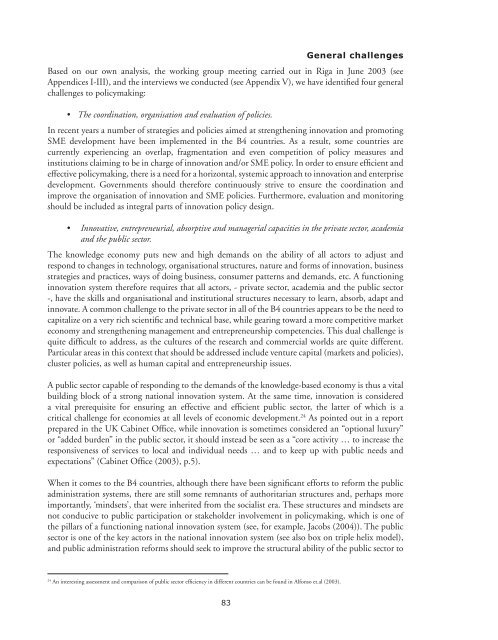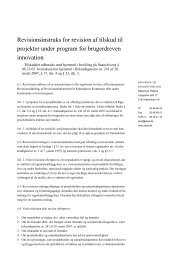Competing in the Single Market - SMEs and ... - Erhvervsstyrelsen
Competing in the Single Market - SMEs and ... - Erhvervsstyrelsen
Competing in the Single Market - SMEs and ... - Erhvervsstyrelsen
Create successful ePaper yourself
Turn your PDF publications into a flip-book with our unique Google optimized e-Paper software.
General challengesBased on our own analysis, <strong>the</strong> work<strong>in</strong>g group meet<strong>in</strong>g carried out <strong>in</strong> Riga <strong>in</strong> June 2003 (seeAppendices I-III), <strong>and</strong> <strong>the</strong> <strong>in</strong>terviews we conducted (see Appendix V), we have identified four generalchallenges to policymak<strong>in</strong>g:• The coord<strong>in</strong>ation, organisation <strong>and</strong> evaluation of policies.In recent years a number of strategies <strong>and</strong> policies aimed at streng<strong>the</strong>n<strong>in</strong>g <strong>in</strong>novation <strong>and</strong> promot<strong>in</strong>gSME development have been implemented <strong>in</strong> <strong>the</strong> B4 countries. As a result, some countries arecurrently experienc<strong>in</strong>g an overlap, fragmentation <strong>and</strong> even competition of policy measures <strong>and</strong><strong>in</strong>stitutions claim<strong>in</strong>g to be <strong>in</strong> charge of <strong>in</strong>novation <strong>and</strong>/or SME policy. In order to ensure efficient <strong>and</strong>effective policymak<strong>in</strong>g, <strong>the</strong>re is a need for a horizontal, systemic approach to <strong>in</strong>novation <strong>and</strong> enterprisedevelopment. Governments should <strong>the</strong>refore cont<strong>in</strong>uously strive to ensure <strong>the</strong> coord<strong>in</strong>ation <strong>and</strong>improve <strong>the</strong> organisation of <strong>in</strong>novation <strong>and</strong> SME policies. Fur<strong>the</strong>rmore, evaluation <strong>and</strong> monitor<strong>in</strong>gshould be <strong>in</strong>cluded as <strong>in</strong>tegral parts of <strong>in</strong>novation policy design.• Innovative, entrepreneurial, absorptive <strong>and</strong> managerial capacities <strong>in</strong> <strong>the</strong> private sector, academia<strong>and</strong> <strong>the</strong> public sector.The knowledge economy puts new <strong>and</strong> high dem<strong>and</strong>s on <strong>the</strong> ability of all actors to adjust <strong>and</strong>respond to changes <strong>in</strong> technology, organisational structures, nature <strong>and</strong> forms of <strong>in</strong>novation, bus<strong>in</strong>essstrategies <strong>and</strong> practices, ways of do<strong>in</strong>g bus<strong>in</strong>ess, consumer patterns <strong>and</strong> dem<strong>and</strong>s, etc. A function<strong>in</strong>g<strong>in</strong>novation system <strong>the</strong>refore requires that all actors, - private sector, academia <strong>and</strong> <strong>the</strong> public sector-, have <strong>the</strong> skills <strong>and</strong> organisational <strong>and</strong> <strong>in</strong>stitutional structures necessary to learn, absorb, adapt <strong>and</strong><strong>in</strong>novate. A common challenge to <strong>the</strong> private sector <strong>in</strong> all of <strong>the</strong> B4 countries appears to be <strong>the</strong> need tocapitalize on a very rich scientific <strong>and</strong> technical base, while gear<strong>in</strong>g toward a more competitive marketeconomy <strong>and</strong> streng<strong>the</strong>n<strong>in</strong>g management <strong>and</strong> entrepreneurship competencies. This dual challenge isquite difficult to address, as <strong>the</strong> cultures of <strong>the</strong> research <strong>and</strong> commercial worlds are quite different.Particular areas <strong>in</strong> this context that should be addressed <strong>in</strong>clude venture capital (markets <strong>and</strong> policies),cluster policies, as well as human capital <strong>and</strong> entrepreneurship issues.A public sector capable of respond<strong>in</strong>g to <strong>the</strong> dem<strong>and</strong>s of <strong>the</strong> knowledge-based economy is thus a vitalbuild<strong>in</strong>g block of a strong national <strong>in</strong>novation system. At <strong>the</strong> same time, <strong>in</strong>novation is considereda vital prerequisite for ensur<strong>in</strong>g an effective <strong>and</strong> efficient public sector, <strong>the</strong> latter of which is acritical challenge for economies at all levels of economic development. 24 As po<strong>in</strong>ted out <strong>in</strong> a reportprepared <strong>in</strong> <strong>the</strong> UK Cab<strong>in</strong>et Office, while <strong>in</strong>novation is sometimes considered an “optional luxury”or “added burden” <strong>in</strong> <strong>the</strong> public sector, it should <strong>in</strong>stead be seen as a “core activity … to <strong>in</strong>crease <strong>the</strong>responsiveness of services to local <strong>and</strong> <strong>in</strong>dividual needs … <strong>and</strong> to keep up with public needs <strong>and</strong>expectations” (Cab<strong>in</strong>et Office (2003), p.5).When it comes to <strong>the</strong> B4 countries, although <strong>the</strong>re have been significant efforts to reform <strong>the</strong> publicadm<strong>in</strong>istration systems, <strong>the</strong>re are still some remnants of authoritarian structures <strong>and</strong>, perhaps moreimportantly, ‘m<strong>in</strong>dsets’, that were <strong>in</strong>herited from <strong>the</strong> socialist era. These structures <strong>and</strong> m<strong>in</strong>dsets arenot conducive to public participation or stakeholder <strong>in</strong>volvement <strong>in</strong> policymak<strong>in</strong>g, which is one of<strong>the</strong> pillars of a function<strong>in</strong>g national <strong>in</strong>novation system (see, for example, Jacobs (2004)). The publicsector is one of <strong>the</strong> key actors <strong>in</strong> <strong>the</strong> national <strong>in</strong>novation system (see also box on triple helix model),<strong>and</strong> public adm<strong>in</strong>istration reforms should seek to improve <strong>the</strong> structural ability of <strong>the</strong> public sector to24An <strong>in</strong>terest<strong>in</strong>g assessment <strong>and</strong> comparison of public sector efficiency <strong>in</strong> different countries can be found <strong>in</strong> Alfonso et.al (2003).83
















